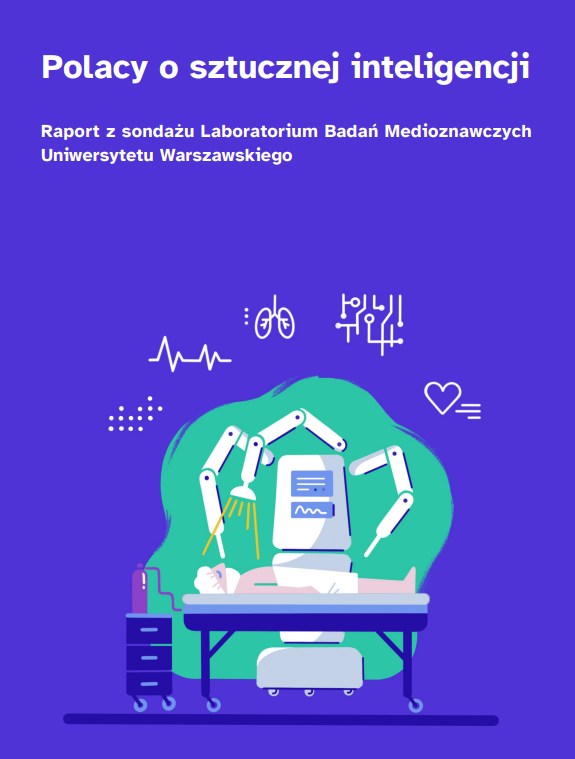 Poles want deliveries using smart drones and care robots, but they are afraid of autonomous cars – these are the conclusions of a survey conducted by the Laboratory of Media Studies at UW dedicated to artificial intelligence. At the same time, Poles do not see the need to regulate this area by law, and a significant part of them has not yet encountered this issue at all. - It is possible that the term "robot" primarily brings to mind the adjective "kitchen" – admits Prof. Tomasz Gackowski, head of the Laboratory of Media Studies.
Poles want deliveries using smart drones and care robots, but they are afraid of autonomous cars – these are the conclusions of a survey conducted by the Laboratory of Media Studies at UW dedicated to artificial intelligence. At the same time, Poles do not see the need to regulate this area by law, and a significant part of them has not yet encountered this issue at all. - It is possible that the term "robot" primarily brings to mind the adjective "kitchen" – admits Prof. Tomasz Gackowski, head of the Laboratory of Media Studies.
The survey was intended to help answer the question of how Poles are exposed to information about artificial intelligence and robotics, what their level of acceptance is for various technological solutions used in different spheres of life, and what their general opinions are regarding the application of artificial intelligence and automation in various spheres of life.
The most important conclusion for this report is the fact that the majority of respondents (71%) declared that they had been exposed to media information about artificial intelligence (AI) in the past 12 months. At the same time, 25% of respondents answered that they could not recall any media content about artificial intelligence they had encountered in the past 12 months.
In the study, we found that declared contact with information about artificial intelligence in the past 12 months is associated with greater acceptance of specific technological solutions. At the same time, contact with media content does not have a statistically significant impact on general attitudes and opinions about artificial intelligence as a social phenomenon.
The study showed that the most accepted technologies were those that help in the daily work of the respondents.
- The least controversial and highly accepted technology (70%) was autonomous deliveries using robots and drones.
- The use of robots in caregiving roles met noticeable resistance from some respondents (30%), but supporters of this technology still prevailed.
- The technology with a higher level of social distance was the use of robots for medical procedures. Nevertheless, most respondents can be classified as supporters of this technology.
- The most controversial technology was autonomous cars, with more opponents (44% - lack of acceptance; 28% - strong lack of acceptance) than supporters (35%).
Artificial intelligence is now something like a non-Newtonian fluid in a child's hands for us – consumers, regulators, researchers. When we try to pat, squeeze, or work intensively with it, it temporarily seems predictable and under control; you can even build something with it. But a moment of inattention, when we put it aside, it immediately flows away, escapes, and loses its predictable form. This will probably continue for some time until we find a way to orderly and somehow regulate the coexistence of humans with this technology, which is inevitable and already happening – comments Dr. Karolina Brylska, Laboratory of Media Studies.
Scientists also asked questions about artificial intelligence as a social phenomenon and its interaction with various spheres of life.
- In the question about the necessity of state regulation and supervision of the technology, affirmative answers prevailed (40%), but a noticeable group of respondents (20%) considered it unnecessary.
- Among the respondents, there is a general agreement with the statement that technological changes based on artificial intelligence will primarily bring benefits to large technology corporations (34%). Few respondents disagree with this statement, although a significant group is undecided (every fourth respondent).
- Regarding the prospects of new professions emerging as a result of the development of artificial intelligence technology, skeptical individuals (23.2%) about the potential for beneficial changes to the labor market prevail.
- In the question about noticeable ethical doubts related to AI, opinions were relatively divided, with a slight predominance of affirmative opinions (30% of respondents agree with ethical doubts, while 17% of respondents express the opposite opinion).
- In the question about the impact of artificial intelligence on students' creativity, respondents were clearly skeptical (every fifth respondent) about the possibility of positive effects of this technology on students' functioning.
According to respondents, robots have the potential to help in their daily work. Women particularly emphasized this, and gender significantly differentiated the results. Of course, an important question in this context is how robots are perceived by women and men – what comes to their minds first when asked about supporting them in their daily work. It is possible that the term "robot" primarily brings to mind the adjective "kitchen” – points out Prof. Tomasz Gackowski, head of the Laboratory of Media Studies.
…………………………………………………………………………………………………………………………………………………………….
The survey was conducted from April 17 to 21, 2023, at the Laboratory of Media Studies using the CATI method (Computer Assisted Telephone Interview). Over five days, the team of interviewers managed to conduct interviews with 1,427 respondents.
The Laboratory of Media Studies at the University of Warsaw (LBM UW) is an interdisciplinary team of specialists – media researchers, linguists, psychologists, sociologists, information scientists, political scientists, and statisticians. LBM conducts research on the content and reception of media, including games and virtual reality.